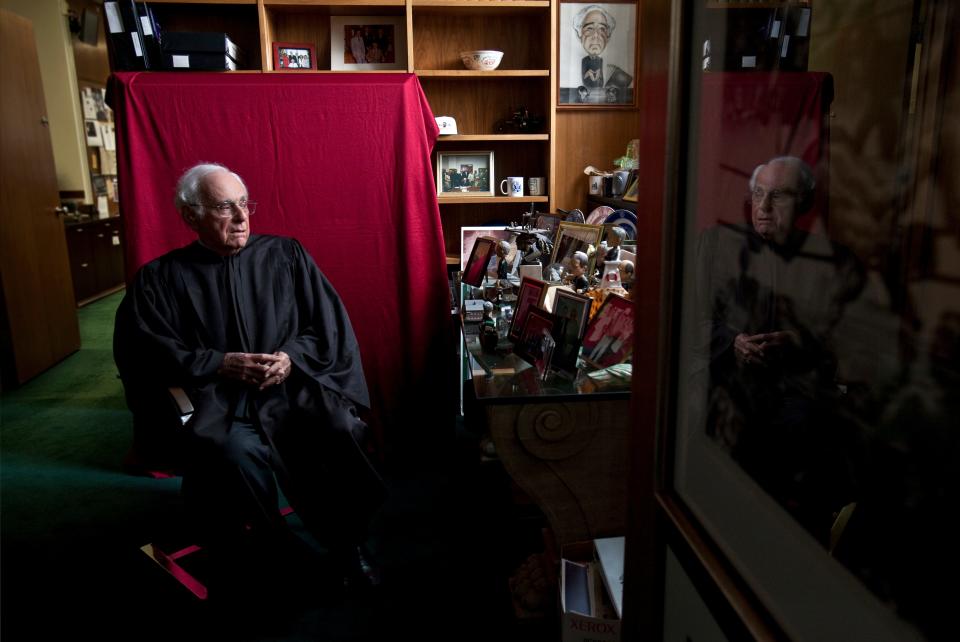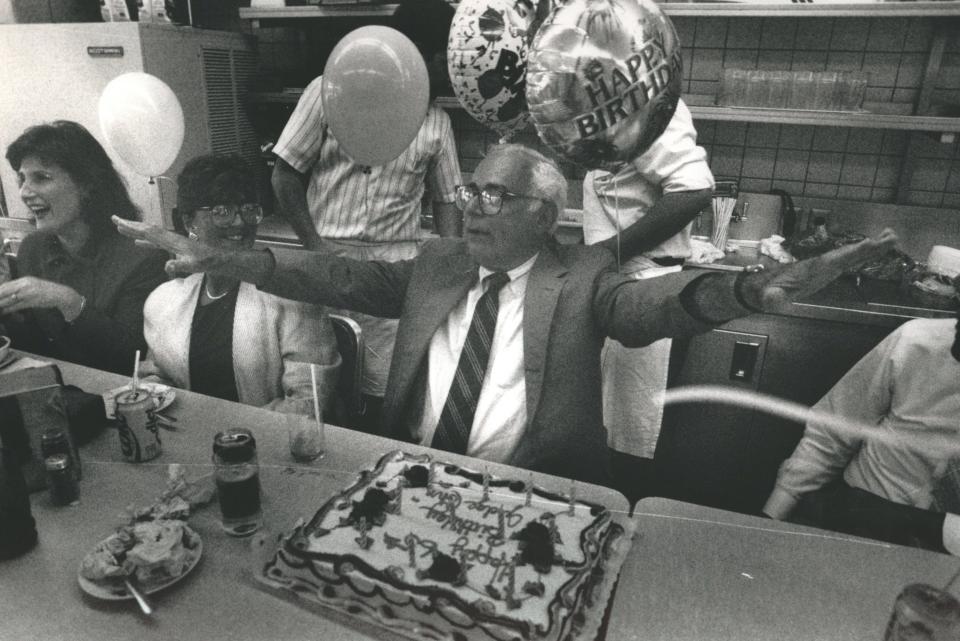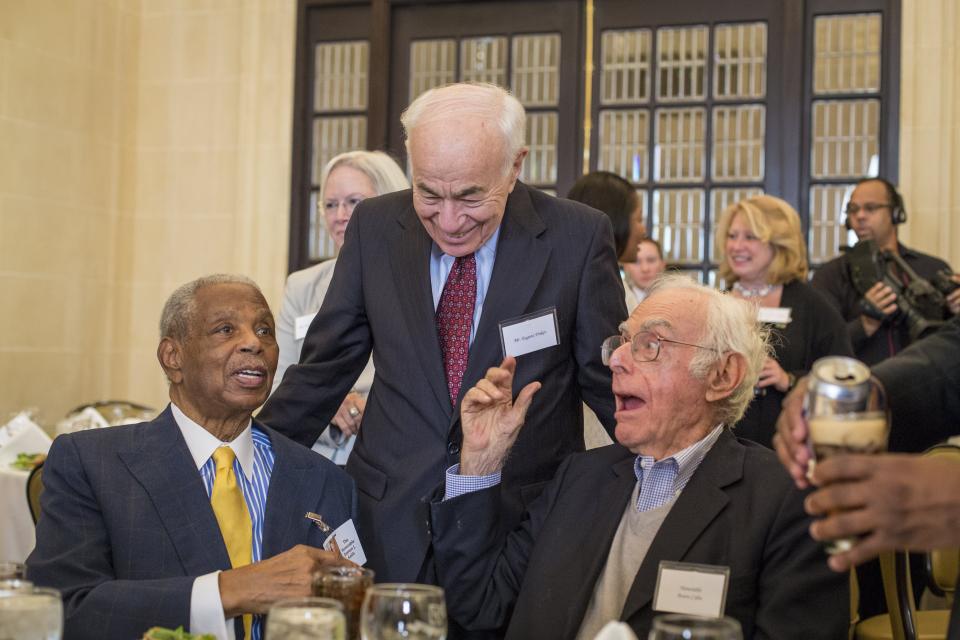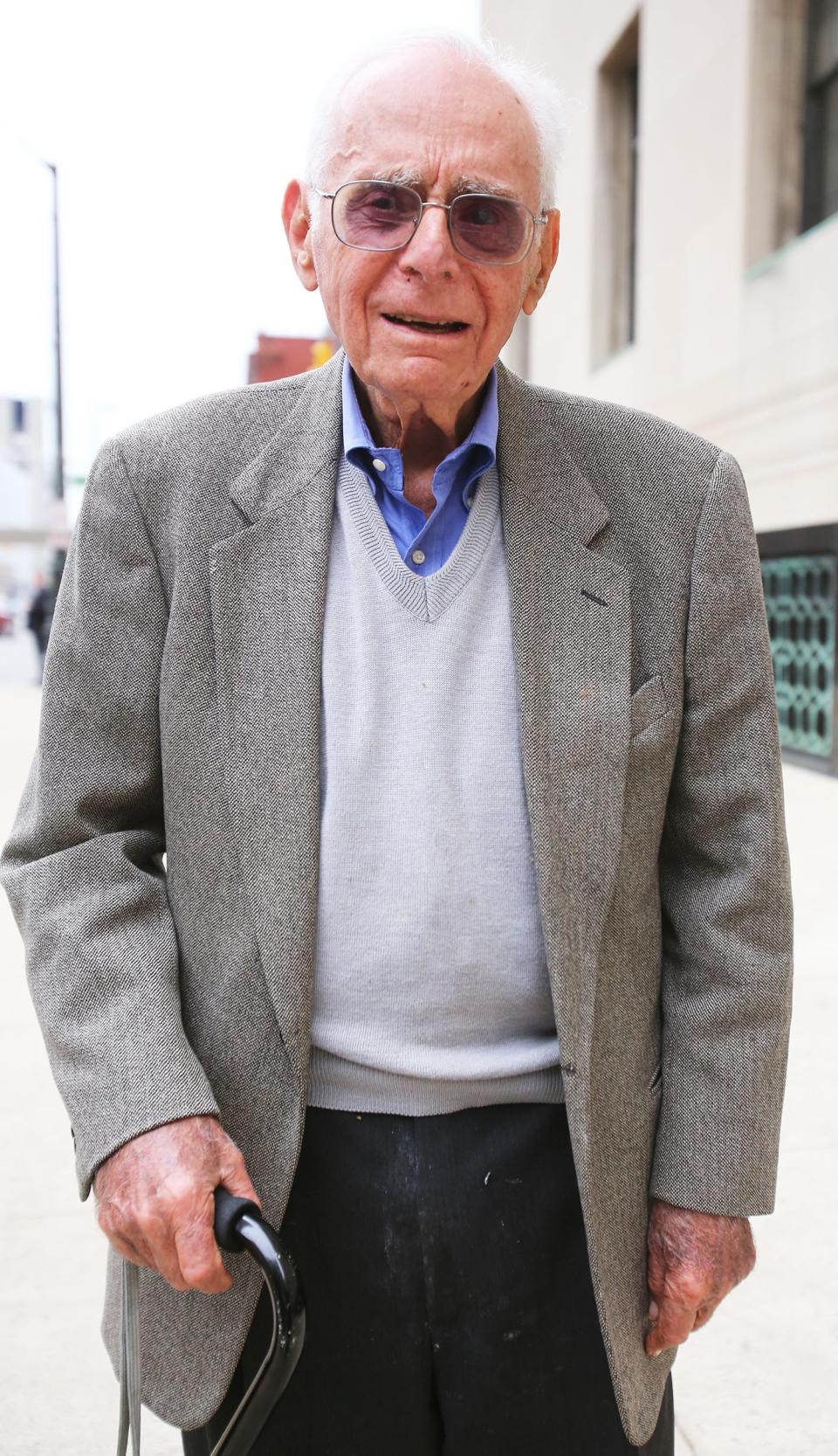Iconic federal Judge Avern Cohn dies at 97: 'He was a unique figure'
- Oops!Something went wrong.Please try again later.
- Oops!Something went wrong.Please try again later.
U.S. District Judge Avern Cohn was a force to be reckoned with.
If lawyers crossed a line in his courtroom, he let them have it.
If reporters wrote something he disagreed with, he let them know it.
When critics called him difficult, he didn't care.
“I had never been a shrinking violet," Cohn said in a 2005 interview. "I was militant, excitable, forceful, occasionally probably interrupted people, occasionally irritated people.”
Cohn, an icon in the Detroit federal courthouse, who, as a young lawyer, represented looters in the 1967 uprising for free, dreamed for years of becoming a federal judge and went on to fulfill that goal with passion, compassion, integrity and grit, died Friday. He was 97.

Cohn, a Detroit native who served on the federal bench for 40 years and oversaw cases until he was 95, died at Beaumont Hospital in Royal Oak following a brief illness, according to court spokesman David Ashenfelter.
News of his death spread quickly through the legal community, saddening many who remembered him as a tough, intelligent, big-hearted judge whose temper sometimes got the best of him, but his goodness always came through.
"Underneath his no-nonsense exterior he was kind and generous, and he had a heart of gold. We have lost an incredible man — a true legend in the law," said former U.S. Attorney Matthew Schneider, who fondly recalled his first case before Cohn.
Cohn kicked him out of his courtroom.
Schneider was prosecuting two friends accused of smuggling people into the U.S. across the Detroit River and suggested one of the defendants cooperate against the other as the case was causing "everyone a lot of heartache."
"He did not like that at all," Schneider recalled. "I can still hear him shouting at me, 'Out! Out!' ... And the next day he called me and apologized. And that was the beginning of our great friendship."
Cohn, many said, had a way of keeping lawyers on their toes.
"When you appeared before him, you knew that you'd better be prepared," said longtime criminal defense attorney Bill Swor, who has practiced for decades in the federal courthouse. "He was a man of enormous intellect and compassion."
Former U.S. District Chief Judge Gerald Rosen echoed that, describing his former colleague of 27 years as "a force of nature" who possessed "shattering brilliance."
"He was among the brightest stars in our legal firmament, and a mentor and dear friend to so many, including me," Rosen said. "His sometimes gruff manner belied a generous and compassionate heart, and his bark was always way worse than his bite."
Longtime criminal defense attorney Steve Fishman can attest to that.
"We will never see his like again. He was a unique figure in the Detroit legal community," said Fishman, noting the judge had "very thick skin."
"The thing I will remember most about Avern Cohn is that he could dish it out in the courtroom," Fishman said. "But he never complained when the lawyers dished it back at him."
Cohn, the grandson of Russian and Polish immigrants, grew up in a close-knit Jewish family who believed privilege came with responsibility to help others. His father was a prominent Detroit bankruptcy lawyer — and later a successful real estate investor and corporate lawyer. His mother was a homemaker.

Cohn decided early to become a lawyer, inspired by his father, though his legal schooling did not begin right away.
During his sophomore year at the University of Michigan, he was drafted into the Armyand spent the next three years of his military service attending engineering and medical schools in Texas, California and Illinois.
It wasn't until after World War II ended that he enrolled at the University of Michigan Law School, receiving his law degree in 1949. He joined his father’s Detroit law firm, and spent the next 30 years in private practice.
Over the years, he got involved in Democratic political campaigns and social causes. In 1963, then-Gov. George Romney, a Republican, appointed Cohn to a Democratic seat on the Michigan Social Welfare Commission.
In 1973, Coleman Young, Detroit's first Black mayor, appointed Cohn to the Detroit Board of Police Commissioners. Cohn said he requested the appointment because he lived in Detroit and wanted a police radio so he could listen to police calls. Young hesitated, but gave him the job and a police radio that Cohn said didn't work very well.
It was a job that came with controversy.
“Coleman Young wanted to integrate the Detroit Police Department and the police commission was his agent for doing so,” Cohn told Bridge. “I made lots of enemies.”
Cohn's relationship with Young, meanwhile, helped pave the way for him becoming a federal judge. Cohn said that it was Young's strong backing, along with support from the United Auto Workers and the Jewish community, that led to President Jimmy Carter nominating him to the federal bench in 1979.
More: Federal Judge Arthur Tarnow dies at 79: 'The most truly human person in the courthouse'
More: Retired federal judge Marianne Battani dies after long illness: 'We have lost a gem'

Over the years, Cohn presided over several high-profile cases.
In 1989, he set a national precedent by striking down the University of Michigan’s anti-hate speech code, the first in the nation, saying it was vague, overbroad and violated the First Amendment rights of students. U-M — Cohn’s alma mater — had to rewrite its policy.
In 1995, Cohn caused a national stir by dismissing criminal charges against Jake Baker, a U-M student who had fantasized on the internet about raping, torturing and murdering women. Baker was the first person to be charged with a federal internet crime. Cohn released Baker from federal custody, and declared that Baker’s writings were constitutionally protected speech. A federal appeals court agreed.
"He was just an immature college kid,” Cohn told Bridge. “He didn’t mean any harm. He just lacked good judgment.”
In the late 1990s, Cohn presided over lawsuits that inventor Robert Kearns filed against automakers for infringing on his patent for the intermittent windshield wiper. Kearns won $30 million in verdicts and settlements from Ford and Chrysler, and his saga inspired a 2008 movie, "Flash of Genius" — though Cohn was never mentioned in it.
Years later, however, Cohn bid $1,500 in a Michigan Opera Ball charity auction and won the right to get his name in an upcoming Elmore Leonard crime novel, only to later discover that the "Avern Cohn" in Leonard’s book was a sleazy lawyer.
In 2008, Cohn declined to jail Nada Prouty, a Lebanese immigrant who admitted faking a marriage to become a U.S. citizen and, eventually, an FBI agent and CIA operative. The government said she had shared FBI secrets with her brother-in-law, an alleged terrorist sympathizer. Cohn disagreed, saying the government had blown the case out of proportion.
Two years later, he got one of Detroit's most high-profile public corruption cases: In 2010, Cohn sentenced then-Detroit Councilwoman Monica Conyers to 37 months in prison for taking $6,000 in bribes in exchange for her vote in favor of a $1.2 billion sludge disposal contract.
Perhaps among his most controversial moments came in 2017, when Cohn begrudgingly handed down a 10-year prison sentence in a child pornography case that fueled parental outrage and fears in West Bloomfield. It involved a camp counselor convicted of filming young boys in a locker room and posting their nude photos on a Russian website.
Cohn expressed frustration in handing down the sentence, saying it was too long, but that he was locked into it because of a plea deal prosecutors worked out.
“It is clear to me in the 37 years (that) I have been a judge — this case does not represent one of the government’s finest hours,” said Cohn, who also criticized the news media, calling its coverage of the case “highly inflammatory.”
Cohn also crafted some unique sentences.
In 2018, he gave four convicted food stamp scammers a shame punishment that put an ethnic community in Hamtramck on notice: The Bengali defendants were ordered to place an ad in a local newspaper in both English and Bengali, warning others not to steal like they did.
"They are good Americans. They are good citizens," Cohn said during sentencing. "But they should be told or cautioned that if they cheat on food stamps, they are going to be punished."
Cohn's judicial colleagues remember him for his commitment to fairness and justice, dedication to democracy and love of Detroit.
“Judge Avern Cohn was a legend. Every trial lawyer who appeared before him knew of his brilliant intellect, his courage to do justice regardless of criticism, and even his — often justified — temper," said U.S. District Judge Terrence Berg. "We lost another one of the greats. God rest his soul.”
U.S. District Judge Paul Borman described Cohn as his mentor for 50 years "in the most important values in life," and noted that Cohn reminded him "almost daily of the judge’s role in pursuing equal justice for all of the people in our society. I will miss him.”
Cohn stepped down from the bench in 2019 at the age of 95. At that point, he was the oldest serving judge in Michigan.

Cohn compared his life to acting in a play. His role was the judge — and he felt he played it "rather well."
"I think I’ve upheld my part of the justice system," Cohn told Bridge. "And I think in some measure that I’ve influenced others.”
Cohn was predeceased by his first wife, Joyce (Hochman) Cohn, who died in 1989 after 35 years of marriage. They had three children. In 1992, he married Lois Pincus, a Birmingham art gallery owner.
Funeral service will be held at 2 p.m. Monday at Ira Kaufman Chapel, 18325 W. 9 Mile Road in Southfield. The funeral service will be live-streamed via the Ira Kaufman Chapel website, www.irakaufman.com. Interment will follow at Clover Hill Park Cemetery, 2425 E. 14 Mile Road in Birmingham.
Memorial contributions for Judge Cohn may be made to the Jewish Historical Society, American Civil Liberties Union, Detroit Symphony Orchestra, and the Jewish Association for Residential Care.
Contact Tresa Baldas: tbaldas@freepress.com
This article originally appeared on Detroit Free Press: Federal judge Avern Cohn dies at 97

